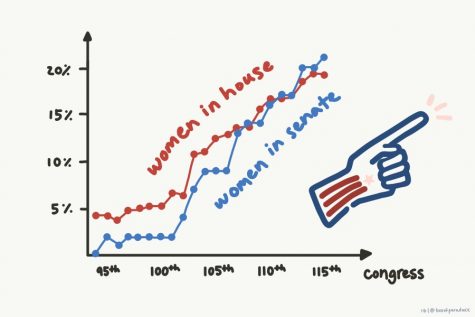Women’s wave in midterm elections is monumental for Americans
November 29, 2018

The 2018 midterm elections have come and gone. They were the most important midterms of our lifetimes so far, and the first election many of us voted in.
The midterms were voters’ first concrete chance to shift power away from the authoritarian Trump administration and back into the hands of the people. Pundits spent months agonizing over polls and scandals, trying to predict the likelihood of the ‘blue wave’ in Congress. None of them got the story exactly right.
Despite a last-ditch effort from President Trump to rally conservative support with fear-mongering about the migrant ‘caravan’ and an egregiously gerrymandered electoral map, Democrats won big all over the nation, even in districts and states where Trump took the majority vote in 2016.
Most significantly, women and people of color were swept into office like never before. More than one hundred women won their races in extremely competitive districts. These women are of all different races, creeds, sexual orientations and political ideologies, and their success is indicative of a change in the American political landscape.
Sharice Davids, a lesbian, Native American woman, won her house seat in Kansas’ 3rd Congressional district. She, along with Deb Halaand of New Mexico’s 1st Congressional District, is one of the first Native American women to be elected to Congress. Davids graduated from a local community college before earning her law degree from Cornell and going onto a White House fellowship under the Obama administration. She is highly qualified for the position.
Her opponent, four-term incumbent Republican Rep. Kevin Yoder, is the chairman of the Homeland Security Subcommittee for Appropriations. This means that he is an essential player in President Trump’s push for funding for the border wall. Davids replacing him provides a cushion for Democrats to negotiate with the Trump administration on this topic.
Angie Craig flipped Minnesota’s 2nd Congressional District. She is the first lesbian mother to be elected to Congress. Ilhan Omar, who won Minnesota’s 5th Congressional district, is the first Somali-American in Congress. Sylvia Garcia and Veronica Escobar, of Texas’ 6th and 16th Districts, respectively, are the first Latinx women Texas has elected to Congress.
Though Democratic women suffered some tough losses, Stacey Abrams in Georgia being the most high-profile, the female momentum in the party is undeniable. This election was the result of women all over the U.S. saying “If not now, when? If not me, who?” Organizations like Emily’s List provided road-maps for these first-time candidates whose aid was invaluable in their races.
Emily’s List candidate Abigail Spanberger flipped Virginia’s 7th Congressional District. Her opponent, incumbent Dave Brat, was a darling of the Tea Party. His ultra-conservative values have earned him a 100 percent rating from National Right to Life, and he has used his position in Congress to promote the repeal of Obamacare and reduce taxes.
During a debate between the two candidates, Brat refused to call Spanberger by her name, instead repeatedly calling her “Nancy Pelosi.” In a now viral clip, Spanberger responded by eloquently dismantling his argument closing by stating, “Abigail Spanberger is my name.”
Spanberger defeated Brat with 50.4 percent of the vote and ended election day with a rousing speech at her victory party, in which she held back tears and seemed awed by her own success.
That awe is the other significant marker of change in this election. These women, most of them Democrats, were utterly humbled by the prospect of the office. In contrast to the often arrogant, entitled men they are replacing, they are honored to represent their constituents in Washington.
The freshman women of the 116th Congress speak to the change to come in American politics. Their victories send a clear message to the ultra-conservatives currently dominating our policymaking. Your bigotry will not stand. We are coming for you.









Leave a Comment